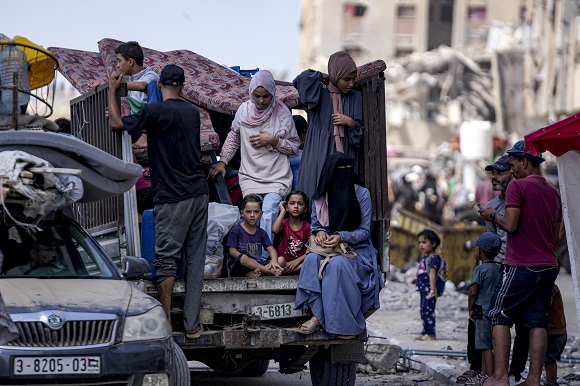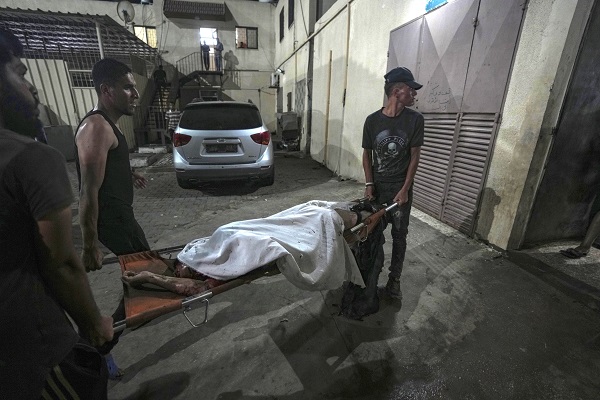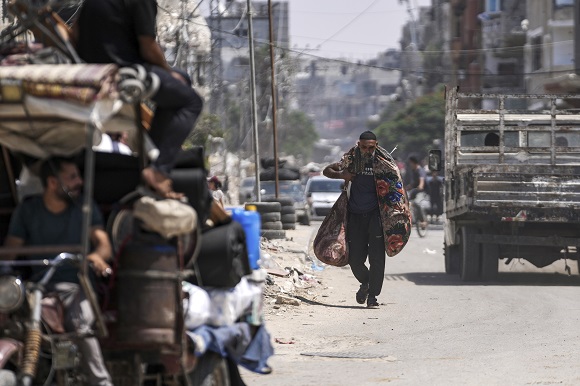We can’t keep living like this. Our species cannot continue living on this planet as though what happens to other people and other organisms around the world has nothing to do with us. We don’t live in that kind of world anymore.
By Caitlin Johnstone
September 8, 2024
An audio version of this article, as read by Tim Foley
compassion, gaza, humanity
The other day someone on Twitter asked me why he should care about what’s happening in Gaza, saying, “Why should I care about anyone that isn’t in a 20 mile radius of where I live?”
I was a bit taken aback by this. I must confess I live in a bit of an echo chamber when it comes to caring about the world; most people I interact with from day to day either agree with me or disagree with me about the abusive nature of the empire and what our problems are and what should be done about them, but the one thing they all have in common is that they care. Outside my little bubble I suspect this “why should I care?” sentiment is probably pretty common, though.
There’s a 2017 Huffington Post article by Kayla Chadwick titled “I Don’t Know How To Explain To You That You Should Care About Other People” which expresses frustration at this type of attitude, because it is very difficult to argue against. If you’re not already the sort of person who would naturally care about the death and suffering in Gaza, it’s going to be hard to get you to see why you should. If you’re missing the part of yourself which hurts when it sees children ripped apart by Israeli bombs, you’re going to have a hard time understanding the value of that part.
But I like a challenge. So I’ve had a bit of a think about it, and I’ve come up with the most honest and complete answer to this question that I am able to produce right now. It might not convince anyone, but it is a well-reasoned answer.
Why should you care about Gaza? Because we can’t keep living like this. Our species cannot continue living on this planet as though what happens to other people and other organisms around the world has nothing to do with us. We don’t live in that kind of world anymore.
For better or for worse, we now live on a planet with eight billion humans who are no longer separated by distance in the way we used to be. This species which spent so much of its development relating to itself in units of small tribes is now an intimately networked global community whose behavior is literally altering the face of this planet, and we need to start acting like it. We need to start doing what Einstein called “widening our circle of compassion” beyond our small tribal units of people we personally know and like, or we simply won’t be able to survive and thrive on this planet.

The inability of ordinary people to think globally is directly affecting our lives in the here and now.
The ability of plutocrats to exploit cheap labor overseas directly affects how much you and your neighbors can earn to provide for yourselves and your families. If we had true international class solidarity, they wouldn’t be able to get away with that anymore.
The ability of corporations to feed our biosphere into the capitalism machine and offload costs of production onto the ecosystem to maximize profits directly affects the kind of environment we’ll all be living in in the coming years. Corporate suits can only get away with this because the citizenry who vastly outnumber them have been manipulated into accepting their cancerous behavior.
The ability of war profiteers and empire managers to push for more war and militarism around the world directly affects how much of our nation’s wealth and resources are allocated to supporting the needs of ordinary people at home, and threatens us all with the looming possibility of nuclear armageddon. The imperial propaganda machine works so hard to manufacture consent for this madness because otherwise nobody would consent to it.
The oligarchs and government agencies who run the US-centralized empire are able to exploit our tendency to only care about our immediate surroundings to construct global mechanisms which affect everything — including our immediate surroundings. All it takes is a little narrative manipulation coupled with our own nearsightedness to keep us from seeing what they’re doing.
They destabilize entire regions in the global south with war and imperialist extraction, and when people start fleeing those horrible conditions they use propaganda to manipulate those in the global north into hating immigrants instead of focusing on what’s driving the mass exoduses.
They deliberately maintain a level of unemployment to artificially depress wages, and then propagandize the working poor into thinking the unemployed are parasitic welfare moochers.
They create a controlled opposition false dichotomy between two mainstream political factions who both serve the capitalist empire in every meaningful way, and then manipulate both sides into blaming all the problems this causes on the other side instead of on the architects of this whole disaster.

These manipulations would not work if our circles of compassion were sufficiently wide. The same moral myopia which causes us to fail to see a Palestinian child as worthy of our care and attention also causes us to fail to recognize the underlying causes of all the major problems we see all around us.
It’s true that caring about that Palestinian child, in and of itself, will yield you no personal material gain. But being the sort of person who would care about that Palestinian child will help pave the way from hell on earth to paradise. Enough humans having a wide enough circle of compassion to care about the suffering of other humans who they will never meet is all it will take for us to create a healthy world.
Our species can no longer existentially afford small circles of compassion. We can no longer afford ignorance and apathy. We’ve got to start learning about what’s happening in the world, thinking in terms of global community, and caring about our fellow beings on this planet in the way we care for our friends and neighbors.
Sure that’s not our tendency right now, but every species eventually hits a point where it needs to adapt or go the way of the dinosaur. That’s where we’re at right now. The days where “rugged individualism” could be defended as a rational worldview are long over, if it was ever rational to begin with.
This isn’t the twelfth century. We’re not going from birth to death in tiny communities unconnected to the rest of the world. Whatever device you’re reading this on has parts from multiple foreign countries, which passed through countless foreign hands to come into yours. We all touch one another’s lives around the world from distances which used to have no relevance to the human experience of this planet.
We need to begin thinking, feeling, and living in accordance with this new reality. We cannot continue along the ecocidal, omnicidal trajectory that our small circles of compassion have made possible, or else we will go extinct.
That’s why you should care about Gaza. Because humanity’s collective failure to care about such things is driving our species further and further into misery and dystopia, and closer and closer to the precipice of eternal oblivion.
My work is entirely reader-supported, so if you enjoyed this piece here are some options where you can toss some money into my tip jar if you want to. Go here to find video versions of my articles. If you’d prefer to listen to audio of these articles, you can subscribe to them on Spotify, Apple Podcasts, Soundcloud or YouTube. Go here to buy paperback editions of my writings from month to month. All my work is free to bootleg and use in any way, shape or form; republish it, translate it, use it on merchandise; whatever you want. The best way to make sure you see the stuff I publish is to subscribe to the mailing list on Substack, which will get you an email notification for everything I publish. All works co-authored with my husband Tim Foley.
The author graciously has granted this website permission to reprint selected articles.
The opinions expressed by the author do not necessarily reflect those of APS Radio News or of its affiliate, APS Radio.


